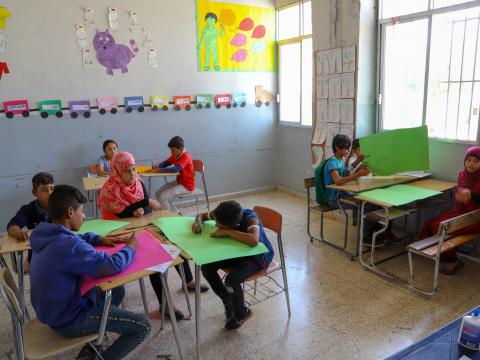Bader and Fawaz: Disability will not stand in their way

Bader, 13, dreams of being a doctor one day. Fawaz, 12, wants to be a pilot when he grows up. Bader and Fawaz, who had once lost all hope, have dreams like ordinary children now. They are two Syrian refugee brothers who attend World Vision’s Basic Literacy and Numeracy (BLN) classes in Qaraoun, Bekaa. Bader is deaf and consequently mute, and Fawaz has only 10% of his eyesight remaining. Finding a place to receive basic education was a struggle for their parents, before joining World Vision’s programme.
“It was definitely a struggle at the beginning. It is difficult to teach someone who cannot hear or can barely read. It was challenging, but I never lost hope,” admits Mohammed, Bader and Fawaz’s teacher. World Vision’s Basic Literacy and Numeracy (BLN) programme aims to help Syrian refugee children between the ages of 10 and 14, who left school or did not have any education to integrate into normal middle schools.
“We teach children four basic subjects: Arabic, English, Math, and Life Skills. We use new active learning methods to grab their attention. This includes group work, activities, and games,” says Mohammed.

Mohammed was committed to achieving significant progress with Bader and Fawaz, and he succeeded. “I focus on their strengths and weaknesses and customize my teaching methods accordingly. I communicate with Bader using basic sign language; and when he is doing a writing exercise, I slowly repeat the letters so he can read my lips,” he continues. “As for Fawaz, after writing on the board, I rewrite everything on a piece of paper in front of him and re-explain,” says Mohammed. “Everyone deserves a chance to learn, to be educated, regardless of their disabilities or financial status. Hopefully, one day, they will use what they learned and live a good life,” he adds.
Bader and Fawaz’s mother, 42-year-old Hanaa, was forced to leave her country. She lost her home and ended up living in a tent, with a sick husband and 11 children to take care of. Out of the eleven children, six children have disabilities: four have hearing impairment, one child who is completely blind, and another who is still holding on to 10% of his sight. Hanaa has been through it all. “We arrived to Lebanon six years ago. Our home was completely destroyed. I lost everything due to this horrific war,” she says. “I had already suffered a lot in Syria, knowing that six of my children have disabilities and need constant care. Now I need to worry about providing them with the basic needs as well,” she adds.

The lines on Hanaa’s face denote the hardships she has undergone. “Four years ago, my husband had a stroke which left him unable to work. Now, two of my children work in the field to support the family. They earn 6,000 LBP (4 USD) per day. We also receive assistance from the humanitarian organizations, but we barely make ends meet,” she admits.
With funding provided by the United States and World Vision supporters in the United States and Korea, World Vision in Lebanon is able to provide 60 Syrian refugee children in Qaraoun, Bekaa with Basic Literacy and Numeracy (BLN) classes. After years of not receiving any education, Bader and Fawaz were introduced to the world of letters, numbers, and words. The boys' willingness to progress is stronger than their disabilities. They took advantage of every session, every lesson, and every minute spent at the centre. Feeling optimistic, Mohammed believes that Bader and Fawaz have a chance to live a better life. “They have been here for only eight months and their communication skills have gotten a lot better. They are able to identify the letters and write them. I believe they will be ready to integrate into a normal school,” he reveals.

Tracy Khalaf, World Vision’s Disability Inclusion Officer, acknowledges the importance of the new inclusive educational method in helping children with disabilities adjust to education. “World Vision started implementing Inclusive Education a year back, and we have been noticing great impact every day,” she says. “Our Inclusion programme starts with identifying cases at field level, registering them in our program, assessing their development, tracking their improvement, coaching the teachers and tuning an individual plan for each child,” Tracy adds.
Inclusive Education benefits both disabled and non-disabled children. “Inclusion works both ways, we include the child with disability in a general learning space, the child benefits from being surrounded, cared for, and taught. While the rest of the children develop social-emotional skills that let them accept, embrace and mend fences with all children,” she continues.

Bader and Fawaz can dream and live like normal children. “All I wish and pray for is that my children get the proper care they need. Thanks to World Vision, Bader and Fawaz improved a lot. Bader is able to pronounce better, and Fawaz seems more knowledgeable and focused,” says Hanaa.